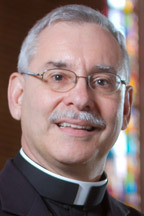
Bishop Anthony B. Taylor delivered this homily March 2.
Confirmation is our own personal Pentecost. Two thousand years ago, the Holy Spirit filled the apostles with power and light, opening their minds to understand reality from God’s perspective and then empowering them to go forth to build the Kingdom of God.
In today’s Gospel Jesus warns us about a danger connected with our unavoidable need to earn a living: “You cannot give yourselves to God and money. I warn you, then: do not worry about your livelihood, what you are to eat or drink or use for clothing … look at the birds in the sky. They do not sow or reap … yet your heavenly Father feeds them. Are you not more important than they?”
Jesus warns us not to give more importance to things than to our relationship with God. Here he is talking about food, drink and clothing — can you imagine what he would say about putting luxuries before our relationship with God? This idolatry is a very easy trap to fall into. And when this becomes our whole world, we begin to view all of reality as just so many goods, including ourselves and each other! Sad to say, our American society has bought into this "consumer mentality.”
For instance: Whenever the main reason we come to church is to get something out of it, we’ve made religion into a commodity. Mass should be a good experience, but if we leave angry because we didn’t like the homily or the music, we need to ask ourselves why we came in the first place. The main reason for coming to church is to give rather than to get; to give ourselves to the Lord and to give him thanks for his many blessings. Eucharist means “thanksgiving.”
Children become a commodity when we view them as such a burden that our first step is to calculate how many we can afford and use artificial contraception to prevent excess inventory rather than using natural family planning to work with the Lord in being wise stewards of the gift of life.
But that’s not how it is for most Americans. In American law today, the parents are consumers and the child in the womb is a commodity. The parents decide whether to keep the product or send it back (abortion), especially if quality control (amniocentesis) says there are defects. Some sue for damages if the doctor doesn’t give them a perfect baby.
This attitude also places tremendous pressure on young people when they grow up feeling like a commodity, valued for what they produce rather than loved simply for who they are. And in contracepting families, the fewer the children, the greater the danger, especially when the parents have invested so much of their hope for success as the world judges success in that one or two children whom they love with all their hearts, but may not really understand how heavily the pressure of their often unspoken consumer-driven expectations weighs on their children. This leads some teenagers to seek escape through drugs or other self-destructive behaviors.
Adults in the work force become commodities, valuable so long as we are productive members of society. Our salaries tell us how much we are worth. Did you ever wonder why so many retirees die within a year of retirement? They no longer feel worth anything.
Jesus challenges this consumer mentality. He calls it idolatry. He calls it slavery. He says, “You cannot be the slave of both God and money.” None of us can be the slave of two masters. We will either hate the first and love the second, or treat the first with respect and the second with scorn.
Each of us chooses the master of our life and in confirmation the Holy Spirit gives you all the gifts you need to make the right choice: wisdom, understanding, counsel, knowledge, fortitude, piety and fear of the Lord. Will we live according to the consumer mentality which promises happiness that it cannot deliver and values us only for what we produce?
Or will we live according to Jesus’ way of truth and life, which values us for who we really are — children of God and temples of the Holy Spirit, having God-given intrinsic worth from the first moment of conception, through those unproductive years of childhood and those supposedly unproductive years of old age, all the way to natural death?
Please read our Comments Policy before posting.
Article comments powered by Disqus Studio 3:16 offers new approach to teaching religion
Studio 3:16 offers new approach to teaching religion
 After three decades, NLR principal plans to retire
After three decades, NLR principal plans to retire
 CHS athlete overcomes odds to reach collegiate goal
CHS athlete overcomes odds to reach collegiate goal
 John Calipari: UA basketball coach and devout Catholic
John Calipari: UA basketball coach and devout Catholic
 'Cabrini' film tells story of saint with great faith
'Cabrini' film tells story of saint with great faith
 St. Joseph a model of solidarity with immigrants
St. Joseph a model of solidarity with immigrants
 Two gifts after Jesus’ death: Virgin Mary and Eucharist
Two gifts after Jesus’ death: Virgin Mary and Eucharist
 Why we have an altar, and not just a communion table
Why we have an altar, and not just a communion table
 Pope: Wars should be resolved through nonviolence
Pope: Wars should be resolved through nonviolence
 Living relationship with Jesus Christ in the Eucharist
Living relationship with Jesus Christ in the Eucharist